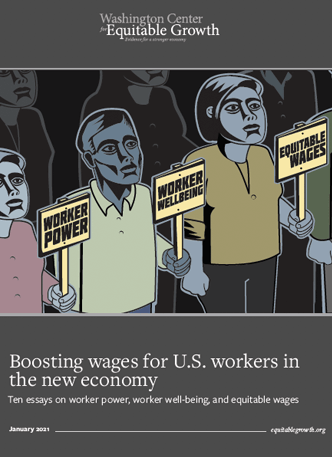Boosting Wages for U.S. Workers in the New Economy
The U.S. labor market is shackled by decades of wage stagnation for the majority of workers, persistent wage disparities by race, ethnicity, and gender, and sluggish economic growth. The steady increase of income inequality since the 1970s leaves generations of U.S. workers and their families unable to cope with the daily costs of living, let alone save for emergencies or invest in their futures—conditions that have left many families ill-prepared for the “stress test” of the coronavirus recession. These labor market ills particularly affect women and workers of color due to decades of gender inequality and structural racism erecting barriers to opportunities.
There is increasing evidence that broad structural inequality leads to a misallocation of talent and the undervaluation of different types of work, which contributes to anemic economic growth and slower productivity gains. Boosting Wages for U.S. Workers in the New Economy, a joint effort of Equitable Growth and the Institute for Research on Labor and Employment at the University of California, Berkeley, presents a series of essays from leading economic thinkers, who explore alternative policies for boosting wages and living standards, rooted in different structures that contribute to stagnant and unequal wages. The essays cover a variety of strategies, from far-reaching topics such as the U.S. social safety net and tax policies to more targeted efforts emphasizing laws governing American Indian tribal communities and the barriers facing women and workers of color in the science, technology, engineering, and mathematics fields.
To download the entire book as a pdf, click here.
To read the essays online, click here.
Read the foreword and introduction here prior to reading the essays outlined below.
Worker power
Strategic enforcement and co-enforcement of U.S. labor standards are needed to protect workers through the coronavirus recession
Transforming U.S. supply chains to create good jobs
Boosting wages when U.S. labor markets are not competitive
Collective bargaining as a path to more equitable wage growth in the United States
Worker well-being
U.S. labor markets require a new approach to higher education
Public investments in social insurance, education, and child care can overcome market failures to promote family and economic well-being
Targeting business tax incentives to realize U.S. wage growth
Equitable wages
Addressing gender and racial disparities in the U.S. labor market to boost wages and power innovation
Place-conscious federal policies to reduce regional economic disparities in the United States
Sovereignty and improved economic outcomes for American Indians: Building on the gains made since 1990
Events
Ideas to Boost Wages in the New Economy: Ten Essays on Raising Wages for U.S. Workers, Washington Center for Equitable Growth, January 14, 2021

